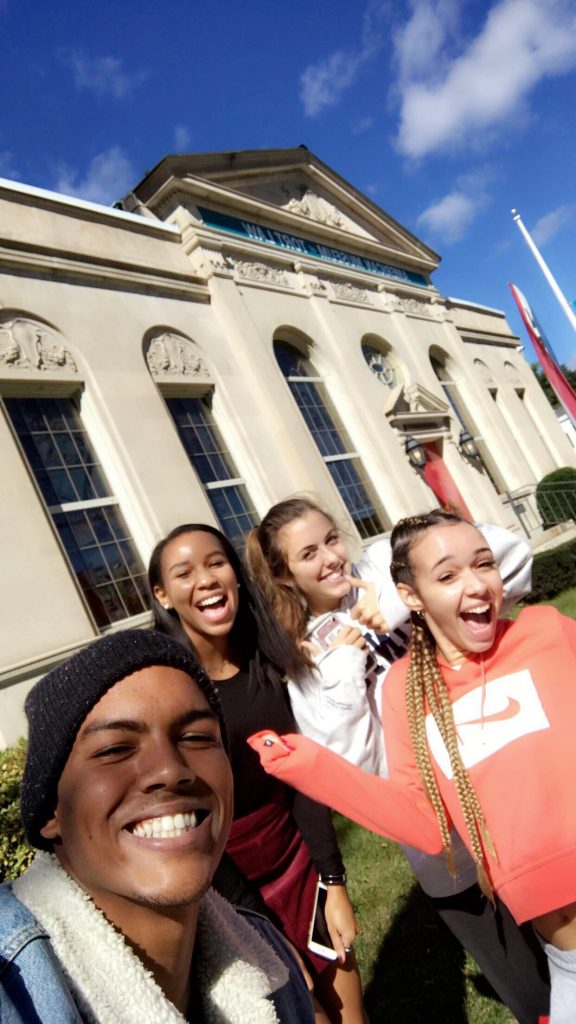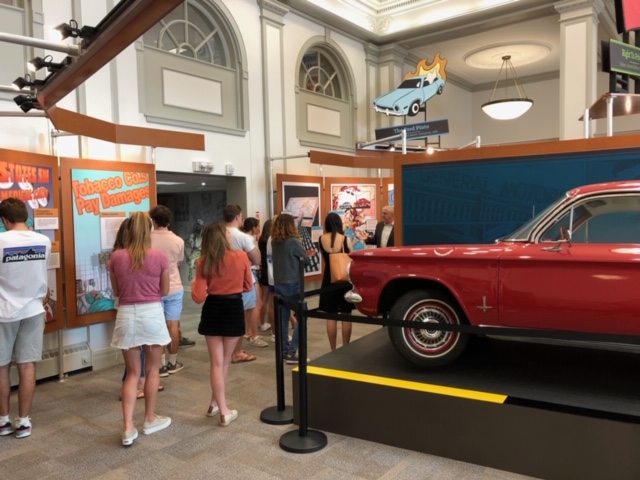
Caila French, Emma Buckley, Jessica Jones, and Marshal Cohen pose for a selfie in front of the American Museum of Tort Law. Photo courtesy of Marshal Cohen.
By Brendan W. Clark ’21
Editor-in-Chief
Professor of the Practice Glenn Falk and his Fundamentals of American Law class visited the American Museum of Tort Law in Winsted, Connecticut on Wednesday, October 10, 2018.
The museum, founded by Ralph Nader in his hometown, “educates and inspires people about the benefits of trial by jury and tort law,” according to their pamphlet. Tort law, says Nader in “Suing for Justice,” evolved from medieval English law and later grew because of “millions of actors and judicial decisions that proceeded in small but steady advances” (57). Nader then traced some decisions of note and the efforts by many, from insurance companies to the pharmaceutical industry. Ultimately, Nader highlights the imperative nature of the “marvelous right to trial by jury,” which, as he posits, “requires a most robust defense.” You can read more about tort law and its varied history by reading Nader’s article here.
Black’s Law Dictionary defines a tort as “a civil wrong, other than a breach of contract, for which a remedy may be obtained, usually in the form of damages; a breach of a duty that the law imposes on persons who stand in a particular relation to one another.”
The museum has been praised by many, with The Washington Post remarking that the museum “reminds visitors how unhealthy American lives were not so long ago” and Politico calling it “fun, creative, visually stunning and provocative.”
But more important than the opinions of national news, attorneys, or even Black’s, were the reactions and thoughts of the students themselves. The Policy Voice spoke with some of them and this is what they had to say about the museum and the lessons it imparts:
“Going to the American Museum of Tort Law I think was a great experience for everyone who got to go. Before going, I had no idea what tort law was, so I was very excited to get to learn about something new. The staff was very passionate about torts and they were very excited to see a group of Trinity College students who were learning about torts in class visit the museum. Also, I had no idea how you could make a museum about torts interesting, but there were many props and cartoons that made the learning fun and interactive.”–Emma Buckley ’21
“The American Museum of Tort Law was a great way to experience tort law in a more engaging way. The museum was effective in that it really helped to bring to reality what is largely a theoretical concept, particularly for students just starting to explore law-related topics. I especially enjoyed how the museum used real cases from history to explain tort law. I found it really interesting how the museum was able to use these historical tort law cases to demonstrate the effects they still have today. I found the experience both educational and interesting. I would definitely recommend it to anyone interested in law!”–Carla Concha ’19
“As someone who has been oddly obsessed with crime my entire life, I saw myself going into criminal law. I’ve always wanted to represent the underrepresented, and protect people from our country’s habit of throwing people, most often poorer people, in jail and throwing out the key. After visiting the Tort Museum, for Professor Falk’s class, I realized there may be other ways to represent the underrepresented. I had the preconceived idea that tort law was just lawsuits filed for money. After learning about some of the greatest examples of how tort law has made a difference for huge groups of people, my mind was opened. I learned that these lawsuits are not only about seeking financial reparations for a specific incident, but they are about holding huge corporations accountable for often putting money ahead of real people and their well-being. Our legal system gives us a chance to set examples of companies and people who are participating in practices that are ending up harmful to others. I think it is about showing these companies that they WILL be held accountable by our legal system.”–Ally Lansbury ’20
“When Professor Falk told us we were going to visit the American Museum of Tort Law, I had quite a few questions, the first being “What is tort law?” As our course continued and we actually had the opportunity to learn more about tort law and understand its significance within the legal system, I became more and more intrigued as to what could be in store. Although I missed the original field trip with the entire class, 3 of my fellow classmates and myself piled into a car and ventured to Winsted, CT to visit the museum for ourselves. I found this to be a particularly interesting trip because it actually put what we were learning in class, into context. The museum explained the importance of trial by jury and the benefits of tort law. Its presentation of things such as important precedent-setting cases and dangerous toys allowed us to develop a deeper appreciation of tort law. By making the museum interactive, it helped shape my understanding of tort law cases within the context of the people’s lived experiences. Sitting in class learning about these cases is a far different experience from being in a setting that encourages you to delve into the details of the cases, which I found to be a very advantageous experience.”–Jessica Jones ’21

Students tour the displays inside the American Museum of Tort Law in Winsted, Connecticut. Photo courtesy of Glenn Falk.
If you would like to visit the museum for yourself, the drive is only about an hour away from Trinity at 654 Main Street, Winsted, CT 06068. The museum is open from 10:30 a.m.-5:00 p.m. from April 1-December 31 and is closed on Tuesday. You can learn more by visiting their website at http://www.tortmuseum.com or by calling 860.379.0505.
